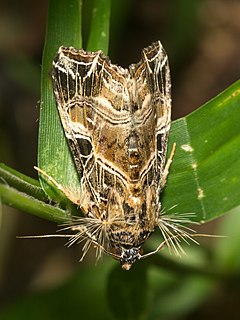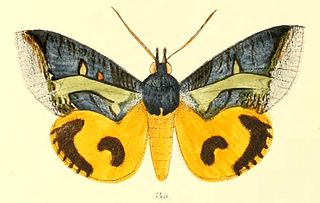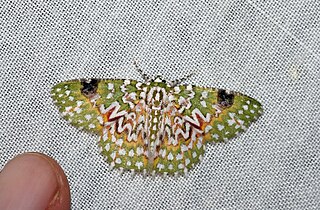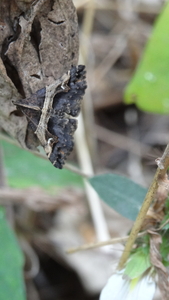Naarda ineffectalis is a type of moth in the family Noctuidae first described by Francis Walker in 1859. It is found in India, Sri Lanka, Borneo and Sula.

Bleninae is a monotypic subfamily of the moth family Nolidae. Its single genus, Blenina, was erected by Francis Walker in 1858.

Callopistria rivularis is a species of moth of the Noctuidae family. It is found from the Indo-Australian tropics of India, Sri Lanka up to the Solomon islands and Fiji.

Eudocima homaena is a moth of the family Erebidae first described by Jacob Hübner in 1816. It is found in the Indian subregion, Sri Lanka, Taiwan, the Nicobars, Peninsular Malaysia, Borneo, the Philippines and on Christmas Island. It is a major pest on orange plants.

Acronicta pruinosa is a moth of the family Noctuidae. It is found in Sri Lanka, the Himalaya, east to Japan and Taiwan south to Myanmar and Peninsular Malaysia, Borneo, Java and New Guinea.

Ctenoplusia limbirena, the Scar Bank gem, or silver U-tail, is a moth of the family Noctuidae. It is found in south-western Europe, Africa, the Canary Islands, Arabia, the southern Himalayas, India, Sri Lanka, Indochina to south-eastern China, Taiwan, Sulawesi, Bali and Timor. In New Zealand, it has been established since 2011.

Chiasmia emersaria is a moth of the family Geometridae. The species was first described by Francis Walker in 1861. It is found in India, Nepal, northern Thailand, China, Sri Lanka, Japan and the Ryukyu Islands.

Eucyclodes gavissima, the Oriental orange banded green geometer moth, is a species of moth of the family Geometridae described by Francis Walker in 1861. It is found in the Indian subregion, Sri Lanka, Bhutan, western China, Taiwan, Sumatra and Borneo.

Platyja umminia is a species of moth of the family Noctuidae first described by Pieter Cramer in 1780. It is found from the Indo-Australian tropics of China, Japan, India, Sri Lanka, Myanmar to New Guinea and Queensland. It is also present on Guam. Adults have been recorded piercing fruit in Thailand and Guam.
Bocana manifestalis is a moth of the family Erebidae. It was first described by Francis Walker in 1858. It is widespread from India through the Pacific.

Hydrillodes lentalis is a species of moth of the family Erebidae described by Achille Guenée in 1854. It is found in south-east Asia and Australia (Queensland).

Xylostola indistincta is a species of moth of the family Noctuidae first described by Moore in 1882. It is found from the Indo-Australian tropics of India, Sri Lanka to New Guinea.

Adrapsa ablualis is a species of moth in the family Noctuidae that can be found in Queensland in Australia and in Southeast Asia. It was first described by Francis Walker in 1859.

Hyperythra lutea is a moth in the family Geometridae. The species was first described by Caspar Stoll in 1781. It is found in Indian subregion, Sri Lanka, South East Asia, Sundaland.
Eriopithex recensitaria is a moth in the family Geometridae first described by Francis Walker in 1862. It is found in Sri Lanka, Taiwan, on Borneo and in the Australian state of Queensland.
Collix hypospilata is a moth in the family Geometridae. It was described by Achille Guenée in 1857. It is endemic to Sri Lanka.

Hypomecis separata is a species of moth of the family Geometridae. It was first described by Francis Walker in 1863. It is found in Sri Lanka, India, Java and Borneo.

Isturgia catalaunaria is a moth of the family Geometridae first described by Achille Guenée in 1858.
Eurosia trimaculata is a moth of the subfamily Arctiinae first described by George Hampson in 1893. It is found in Sri Lanka.

Bertula abjudicalis is a moth of the family Noctuidae first described by Francis Walker in 1859. It is found in India, Thailand, Laos, Vietnam, Taiwan and from Sri Lanka to Australia, where it has been recorded from New South Wales.














